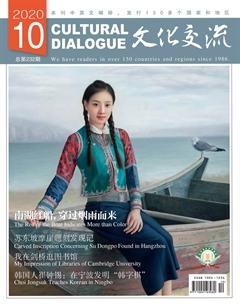由《杏花图》忆汪曾祺
2020年是一代文学大家汪曾祺诞辰100周年。
只是汪曾祺先生离开我们已有23年了,每当想起他那亲切温和的音容笑貌,我就会心痛。这么好的一个老头,无论文采还是为人,能与之媲美的人在我心目中真的不多。我恨老天,为什么让这么一个难得的老头,就这样早早地离开了这个拥挤的世界?
认识汪曾祺先生是在20世纪80年代初。那时我在中国作协文学讲习所(今鲁迅文学院)学习,其间受邀参加了《收获》杂志和四川人民出版社联合在峨眉山举办的笔会。
那次笔会参加者几乎都是叱咤文坛的著名作家,而我当时只有20来岁,刚刚在《收获》发了一个中篇小说。我和另外一位也不怎么为人知的北京女作家韩蔼丽,在大佬云集的笔会中显然是最无足轻重的小卒。韩蔼丽自嘲说,咱俩是“末席”。因为是“末席”,不被人注意,所以我们俩老溜边,开小差,扯闲篇,倒也其乐融融。
可这位毕业于北大的才女“末席”,其实心高气傲,看人阅文十分挑剔。那一群文坛大腕,韩蔼丽看得上的似乎没有几个。听说我喜欢汪曾祺的作品,她便一直和我聊汪曾祺其人其事,言谈中,她一口一个“老汪头”,唤这位在我心中有着仙风道骨气质,让我无比崇拜的作家,就像唤一个邻家大爷似的。
那时我刚从杭州到京城上学不久,对皇城根的水深似海和天安门的高大巍峨,尚处于一种莫名的敬畏中,对深埋在京城四下里的大作家也像看天上的星星一样,觉得遥不可及。没想到身边这个自称“末席”的女作家,却可以这样直呼汪曾祺为“老汪头”,大大咧咧地就把一个你崇拜的偶像抹去了光环,一下子让你觉得自己和偶像仿佛对面而坐,亲如家人。我不知天高地厚,立马请求韩蔼丽带我去拜见汪曾祺先生,韩蔼丽答应得镚儿爽脆,就像答应去她邻居家串门。
一个多月后,韩蔼丽约我去她家,吃她先生做的八宝鸭子,我抵挡不住诱惑,去了她家。韩蔼丽拿出了汪曾祺先生的一本签名本《晚翠文谈》交予我,说这是老汪头专门让她带给我的,并欢迎我到他家做客。我当时真有点受宠若惊,当然更多的是感动。这样一位文坛大家,对一个连面都没见过,只是崇拜他的晚辈,却这样郑重地赠送自己的签名著作,这份礼遇和厚爱,让我诚惶诚恐又终身难忘。
世事难料。真正走进汪曾祺先生府上,见到这位亲切慈祥的老头,是在几年以后了。
那时的我,二度进京求学,在首届北大作家班的学习也已经结束,回到浙江的《东海》杂志当了综合组组长,分管诗歌、散文、评论。
因为在京城读书时结了婚,先生是北京人,我回杭州后便形成了夫妻分居两地的局面。杂志社头儿很仁义,说:袁敏,你只要能组到京城名家的稿件,组到一篇,就让你回京一趟。我其时认识京城名家并不多,只好向韩蔼丽求救,说明情况,请她帮忙。我说,我第一个想组的,就是汪曾祺先生的稿子。韩蔼丽当即就在电话里大包大揽,说,没问题,老头人特好!只要告诉他,你这是给人搭鹊桥呢!他一准答应。
有韩蔼丽拍胸脯打包票,我便信心满满地赴京。此时我刚当上妈妈不久,儿子才刚九个多月,还离不开我,便抱着黄口小儿坐上火车。
那天是韩蔼丽陪我去汪曾祺家的。老汪头家住蒲黄榆,是北京南城一座贴马路边的灰色板楼。人来车往,烟火气弥漫,十分嘈杂喧嚣,与我想象中清雅散淡的名士居所相去甚远。给我们开门的是汪曾祺先生的夫人施大姐,慈眉善目,气质优雅。
没想到汪曾祺这么一位蜚声中外的大作家,却住着一套拥挤的三居室。家中陈设简朴,似乎看不到大作家居所里的那种文房四宝、字画卷宗,入眼就是北京寻常人家惯常有的码堆白菜土豆,桌上还搁着早餐后来不及收走的两根油条,几瓣流油的红心咸鸭蛋,半碟花生米,一瓶王致和腐乳。
我略有点紧张的心一下子松弛下来。
这时,老汪头从书房里走了出来,笑呵呵地说,是小猴来了吗?那今天就是小猴拜见老猴啦!听老汪头说这话,我完全傻掉。儿子属猴,但我没想到老汪头也属猴。看来韩蔼丽早就把我的一切告诉了老汪头,老头风趣幽默地一番“老猴小猴”的调侃,完全消除了我初见大作家时的拘谨,我也很随便地和老汪头东拉西扯,把约稿的正事儿轻轻松松就说了。老头一口答应,让我轻而易举就完成了单位的差事。
中午,老汪头留饭。我虽有些不好意思,但因早就听说老汪头是厨艺上佳的美食家,有此口福,哪肯推辞,便不客气地留下了。老汪头走进厨房,三下五除二,不到一小时的时间,就像变戏法一样烧出一桌饭菜。
印象最深刻的,就是早餐剩下的那两根油条,被老头塞了用荸荠、虾皮和小油菜拌的肉馅,切段回锅油炸,外焦里嫩,油条嘎嘣脆,肉馅口感有层次,有嚼头,香极了。那几瓣红心咸鸭蛋剁碎了,配上切成小丁的黑酱瓜炒老豆腐,起锅时撒了金黄的肉松和碧绿的香菜,色香味俱全。老汪头化腐朽为神奇的高超厨艺让我目瞪口呆。
可是,美味佳肴虽好,却似乎没有小猴可以吃的,九个多月的小儿,牙口尚未长全,酱瓜油条之类他根本嚼不了。老汪头一拍脑袋,说:我怎么把小猴忘了!鸡蛋羹,蒸鸡蛋羹。几分钟后,一碗黄灿灿的鸡蛋羹就蒸好了。老汪头抱过我的儿子,坚持要他来喂。没想到还没喂上两口,小猴就稀里哗啦一泡大尿,洒了老汪头一身。我尴尬至极,一个劲地说对不起。老汪头却哈哈大笑,说:好!男子汉大丈夫,想尿就尿!我儿子在老汪头怀里咧着嘴傻笑,全然不知自己犯下的不雅大错。直到今天我都后悔,没有拍下这幅喜乐的老猴怀抱小猴图。
后来,我调到北京工作,隔一段时间就会带着小猴去拜望老猴,每次都很开心。
1997年春末夏初,浙江湖州《南太湖》雜志的主编马雪枫给我来电话,说杂志社要举办一个南太湖女作家笔会,想让我替他们在京城邀请几位大作家与会,最想邀请的就是汪曾祺先生。知道我和汪老熟,要我务必帮忙。和雪枫是多年老友,不好推辞,也很想借此机会陪老汪头回江南故里走走,便一口答应下来。
到老汪头府上转达《南太湖》的邀请时,才知道老头刚从四川宜宾参加一个文学活动回来。宜宾是酒乡,老头又好酒,尽管老头自知肝脏不好,医嘱不能喝酒,但到了酒乡,哪还能自控节制?加上主办方活动安排较紧,弄得人很疲惫。
聽我说明来意,老头便推辞说身体吃不消,去不了。我看老头脸色发黑,精神确实不佳,便不好再说什么,只得怏怏地起身,打算离开。老头大约看出了我的失望,说,你那位朋友叫什么名字?我说,叫马雪枫,下雪的雪,枫叶的枫。老头说,袁敏你等一等,我给你和你的朋友各画一幅画吧。我闻言不由喜出望外,大有因祸得福之感。
老头给我画了一幅《杏花图》,给我的那位老友画了一幅《雪地红枫》。我当时心里还略略有点妒忌之意,觉得汪老将我朋友的名字寓意画中,似乎更用心呢!我哪里会想到,老头其实已经走到生命的边缘,他是用心血在给我们留下绝笔呢!
晚上回到家,便给老友打电话,告知她老汪头身体不太好,笔会去不了了。朋友自然很失望,脱口说,你告诉汪曾祺先生,我们给他专门定制了一盒上好的手工湖笔呢!他一定喜欢的。我搁下老友电话,又给老汪头打电话,告诉他朋友为他备下手工湖笔的事儿。老汪头在电话那头迟疑片刻,轻轻叹了一口气,说,那你明天来取我的身份证,给我订机票吧。我心中一阵狂喜,庆幸事情出现转机。
可我万万没有想到,当天夜里,老汪头的女儿汪潮突然来电话,说她老爸突然便血不止,已送医院抢救。我听闻后心悸不已,暗暗祈祷老头平安,希望不过是虚惊一场!我不相信刚才还让我给他订机票的老汪头会有什么大事,会有突发的劫难!
然而,老天就是那么残忍!老头送进医院就再也没有出来,就此仓促辞世,连话都没有留下,让爱他敬他的人心痛不已!
如今,老汪头离开这个世界已经很久,但每当我看到自己珍藏的那幅《杏花图》,心里仍然会涌上痛楚,内疚像一只蚂蚁,啃咬着自己的心。假如当初我能不那么粗心,及时发现老汪头身体已经出现不适,我是无论如何也不会让老头再画那两张画的呀!
《杏花图》中那淡雅的芬芳多少年来始终没有消散,一缕清幽总是穿越浊世污流拂过我的心头,提醒我:名利身外物,做人才是真!
The year 2020 marks the 100 anniversary of the birth of Wang Zengqi (1920-1997), an essayist, playwright, and gourmet. He passed away 23 years ago. Whenever I think of him, my heart anguishes. As a man of honesty and as a man of letters, he was perfect. Why did the heaven take him away so soon from this crowded world?
I met him in the early 1980s when I, as a young writer taking a writing course offered by China Writers Association, attended a workshop held at Emei Mountain at the invitation of Harvest, a quarterly literary journal, and Sichuan Peoples Publishing House.
Most participants at the workshop were well known writers whereas I was in my 20s with a novella just published in Harvest. Han Aili, a little known woman writer from Beijing, was just like me. We were both nobodies at the workshop and we became friends. A talented writer and graduate of Peking University and quite picky about writers and their writings, Han wasnt particularly impressed by some well known writers at the workshop. However, she admired Wang Zengqi and kept talking about him, referring him as “the old guy” as if Wang had been a dear grandpa living next door.
At that time, I was just a young writer taking a literature course was alone in Beijing with Hangzhou, my hometown, more than 1,000 kilometers away. Beijing as an ancient city struck awe in my heart. Writers in Beijing were like stars in the sky. I was astonished to learn that Wang Zengqi was just a “gentle and sweet old guy” in Hans chat with me. So I boldly asked Han to introduce me to Wang.
A month later, I visited Han at her home and I was entertained with a special duck dinner prepared by her husband. Han gave me an autographed copy by Wang Zengqi. Han said that Wang wanted Han to give the book to me and delivered Wangs message that I could visit him at my convenience. The autographed book and the invitation touched my heart.
When I finally met the “gentle and sweet old guy”, however, it was a number of years later. After the writing course ended, I came back to Beijing again to attend another writing course. I met someone there and got married. I returned to work at a literary journal in Hangzhou. My husband lived and worked in Beijing. The editor-in-chief said if I successfully solicited one contribution from a prominent writer based in Beijing for the journal, I could take a break and stay in Beijing for a period of time. I called Han Aili and explained the situation to her. I asked if she could ask Wang Zengqi to write something for my journal. She said okay. I took my nine-month-old son with me and went to Beijing by train.
Then Han Aili took me to the home of Wang Zengqi. Wang lived in an ordinary apartment building next to a noisy street in the south of Beijing. His wife answered the door. The three-room apartment looked rather shabby and crowded, unlike an elegant residence in my imagination. The “gentle and sweet old guy” stepped out of his studio, a big smile on his face, saying “The baby monkey came to see the old monkey today,” joked Wang, to my surprise and delight. It occurred to me that Han had already told Wang something about me. My son was born in the Year of Monkey. So had been Wang. The ice was broken. I felt relaxed. Wang gladly agreed to write something for the journal. My business was done. Then I was asked to stay for lunch. Wang prepared the lunch and especially cooked an egg dish for my son. I was convincingly impressed by the lunch. After all, Wang was a celebrated gourmet.
Then I transferred to work in Beijing and I regularly brought my young monkey to visit the “old monkey”. We were very happy.
In May 1997, Ma Xuefeng, editor-in-chief of , a literary journal based in Huzhou, asked me if I could invite some Beijing-based writers to appear at a workshop for women writers in Huzhou. The writer they especially wanted to invite was Wang Zengqi. I visited the dear old man. Wang had just come back from a literary event in Sichuan where he had drunk wine. Wang looked tired and dark. After learning about my mission, he declined the invitation. I was disappointed. Seeing disappointment in my face, he offered to create two paintings, one for me and one for my friend Ma Xuefeng.
Back home, I called Ma Xuefeng and reported Wangs decline. Ma said they had ordered a special set of Huzhou brush pens for Wang and asked me to deliver the information. I called Wang. Wang paused for a while and then sighed. He asked me to pick up his identity card the next day and book a flight ticket for him. Wang changed his mind and I was happy that he agreed to attend the literary event. However, that night, Wangs daughter Wang Chao called me unexpectedly. His father was hospitalized after he found he had blood in the stool. I prayed for the dear old man. He didnt come back from the hospital.
Whenever I look at the painting Wang drew for me that day, I feel pain in my heart. If I had paid closer attention, I would have noticed Wang needed to see a doctor immediately and I wouldnt have let him draw two paintings.

